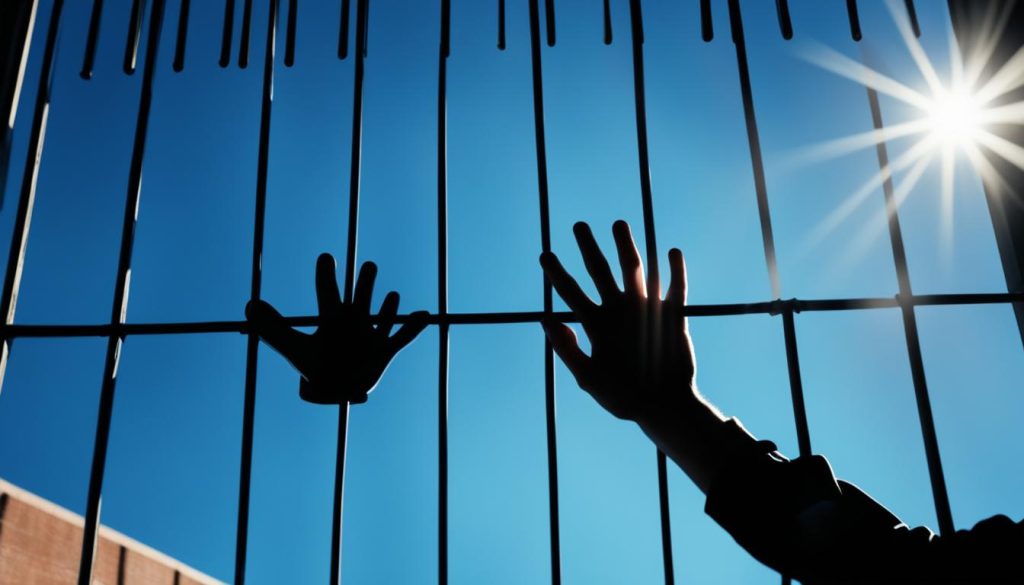When you’re facing criminal charges, your rights are key. The Miranda rights are especially important. They tell you about your legal rights, like the right to stay silent and get a lawyer. Knowing about Miranda rights helps you in the criminal justice system. They protect you from saying things that could harm you and make sure the legal process is fair1.
Understanding Miranda rights helps you make smart choices when dealing with police. It keeps your civil liberties safe and helps you avoid saying things that could hurt you. Following Miranda rights is key to keeping the criminal justice system fair and preventing wrong convictions2.
Key Takeaways
- Miranda rights are a crucial safeguard for individuals facing criminal charges, informing them of their constitutional rights.
- Understanding Miranda rights helps you make informed decisions and avoid self-incrimination when interacting with law enforcement.
- Proper adherence to Miranda rights is essential in maintaining the integrity of the criminal justice system.
- Miranda warnings are designed to protect against coerced confessions and ensure the fairness of the legal process.
- Violations of Miranda rights can lead to the exclusion of evidence, potentially weakening the prosecution’s case.
What Are Miranda Rights?
The Miranda rights are warnings given to people in police custody during questioning3. They tell the person about their Fifth Amendment right against self-incrimination and their right to legal counsel3. These rights protect people from being forced into making statements that could harm them3.
Definition and Purpose
The Miranda rights come from the Miranda v. Arizona Supreme Court case in 19664. The Court said police must tell suspects about their right to stay silent and get a lawyer before questioning4. This is based on the Fifth Amendment’s protection against self-incrimination, making sure people know their rights during police interactions4.
Historical Background: Miranda v. Arizona
The Miranda v. Arizona decision in 1966 made it a rule for police to warn suspects before questioning them4. The warning tells people they can stay silent, that what they say can be used against them, and they can have a lawyer4. This is based on the Fifth and Sixth Amendments of the U.S. Constitution, which protect suspects’ rights during questioning4.
After the Miranda v. Arizona decision, the term “Mirandize” was added to American English, meaning to read the Miranda rights to someone3. Now, every U.S. area has its own rules for what to tell arrested individuals, making sure they know their rights3.
Even though Miranda warnings are important, some people use their rights and don’t say anything, which can stop charges from being filed5. But in Berghuis v. Thompkins (2010), the Supreme Court said if a suspect doesn’t say they want their rights, what they say can be used against them3.
If police don’t give Miranda warnings, statements made by suspects can’t be used in court, as seen in Vega v. Tekoh (2022)3. The warning must be clear, and suspects must be asked if they understand their rights; some places ask after each sentence in the warning3.
“The Miranda warning must adequately and fully convey the rights to the individual being arrested.”3
In conclusion, the Miranda rights are key legal protections that stop people from incriminating themselves and ensure they have a lawyer during questioning5. Knowing about these rights is vital for anyone facing criminal charges or dealing with the police534.
Miranda rights, legal rights, police interrogation
Miranda rights are key to an individual’s legal protection, especially when facing police questioning. They tell suspects about their Fifth Amendment right to stay silent and their right to a lawyer. This helps them make smart choices when dealing with the police3. Keeping Miranda rights in place is vital for a fair criminal justice system. They protect against forced confessions and self-incrimination3.
The Miranda warning comes from a 1966 Supreme Court case, Miranda v. Arizona. It made law enforcement tell suspects their rights before questioning them3. The court said using statements from a suspect who wasn’t told their rights breaks their Fifth and Sixth Amendment rights3.
Every state has rules about what to tell someone arrested or in custody. This includes the right to stay silent, talk to a lawyer, and get one if they can’t afford it3. The warning must be clear, with the suspect confirming they understand their rights3.
Police must tell the suspect they can stay silent, that what they say can be used against them, and they have the right to a lawyer3. There’s no exact way to say the rights, but the main idea must be clear3.
In Berghuis v. Thompkins (2010), the Supreme Court said if a suspect doesn’t say they want to stay silent, their later statements can be used in court3. This shows how important it is for suspects to know and use their Miranda rights during questioning.
The Miranda Rights, from Miranda v. Arizona, include five key points: staying silent, knowing statements can be used in court, having a lawyer during questioning, getting a court lawyer if you can’t afford one, and stopping questioning anytime6.
Miranda rights are a big help, but they’re not the only way to protect yourself during police meetings. The Fifth Amendment also protects you from self-incrimination by letting you not answer police questions without being held back for it6. In cases like loitering or traffic stops, you might need to show who you are and have your ID ready6.
If you’re unsure about your rights when questioned by police, it’s best to talk to a lawyer6. Knowing and using your Miranda and other legal rights helps you handle police interactions better and keeps you safe under the law.
When Miranda Rights Must Be Read
The Miranda rights come from a Supreme Court case called Miranda v. Arizona. They are important rules that police must follow before questioning someone in custody7. These rights let people stay silent and get an attorney, based on the Fifth and Fourteenth Amendments7.
Custodial Interrogation
Police must read Miranda rights to someone in custody and being questioned8. Custody means a person feels they can’t leave the situation with police9. Questioning is when police try to get answers that could show someone did something wrong9. In these situations, the Miranda warnings are given to the person8.
Public Safety Exception
There’s a special rule for Miranda rights in urgent public safety situations7. If there’s a big threat, police can question someone without reading their rights first9. This is to quickly find out about a danger, like where a weapon is or a missing person9. But this rule is very specific and not always used7.
Most traffic stops don’t need Miranda rights unless they limit someone’s freedom a lot8. For Miranda to apply, someone must be in custody and being questioned8. Even without reading rights, statements made in custody can still be used in court if not during questioning8.
Police don’t always read Miranda rights when they arrest someone, but they must if they’re questioning them in custody8. Not reading Miranda Rights matters only if a confession is used against someone in court7.
“The Supreme Court said a Miranda mistake happens only if an unwarned statement is used in a trial.”8
The Right to Remain Silent
The Miranda rights include the right to remain silent. This key right lets people choose not to answer police questions. It protects them from saying things that could be used against them10. By staying silent, suspects can avoid saying things that could harm them, even if they did nothing wrong. This rule is vital for keeping the criminal justice system fair and stopping forced confessions.
Protection Against Self-Incrimination
The right to remain silent is a strong shield against self-incrimination11. Police might try to trick or scare people into saying things that could get them in trouble. By staying silent, people can protect themselves from these tricks and avoid saying things they might later regret12.
Avoiding Coerced Confessions
Staying silent is key to avoiding forced confessions during police questioning10. Police might use tricks or lies to get people to admit to crimes. By using their right to remain silent, people can stop themselves from saying things that could be used against them, even if they’re innocent. This rule is crucial for keeping the justice system fair and protecting people from false confessions.

“The right to remain silent is a fundamental protection against self-incrimination and a cornerstone of the Miranda rights.”
The Right to an Attorney
A key part of Miranda rights is the right to have an attorney during police questioning13. This ensures you can talk to a lawyer and protect your interests during questioning. By asking for an attorney, you can decide if you want to answer questions and avoid saying something that could hurt you14.
The Supreme Court made a big decision in Davis v. U.S.14 They said officers don’t have to make it clear if a suspect is asking for a lawyer14. This shows how important it is for you to speak up and ask for a lawyer during any police questioning14.
Remember, different states have different views on legal rights, which can affect what you can and can’t do14. So, if you get arrested, it’s smart to talk to a criminal defense lawyer. They can help you understand the legal system and make sure your rights are looked after14.
Using your right to an attorney is key to avoiding self-incrimination and making sure the legal process is fair. By asking for a lawyer, you protect your interests and make smart choices during questioning or investigations13. Remember, having legal help is a big part of your Miranda rights, and it’s important to use it to protect yourself131415.
Conclusion
The importance of Miranda rights is huge in the American criminal justice system. These rights, set by the Supreme Court in 1966, protect civil liberties of people facing charges. They tell suspects they can stay silent and get a lawyer, helping them make smart choices and avoid saying things that could hurt them16.
It’s key to follow Miranda rights to keep the integrity of the criminal justice system. If police don’t tell suspects about their rights or use bad tactics, any statements they make might not be allowed in court16. This protects the accused and keeps the justice system fair, stopping wrong convictions and following due process12.
Knowing and using their Miranda rights helps people take part in their defense and protect their rights. This lets them make smart choices, find a lawyer, and avoid saying things that could hurt them17. In the end, following and respecting Miranda rights is key to balancing police work and individual rights. It makes sure the criminal justice system is fair and just for everyone.
Source Links
- What Are Your Miranda Rights?
- What Are Miranda Rights?
- Miranda warning
- Know your rights: What are miranda rights?
- Miranda Rights: What Happens If the Police Don’t Read You Your Rights
- Understanding Your Rights During Police Interrogations
- New Jersey Illegal Search & Seizure Lawyers Lubiner Schmidt and Palumbo
- Are Police Still Required to Read Miranda Rights?
- Miranda Rights for Criminal Suspects Under the Law
- Facts and Case Summary – Miranda v. Arizona
- When Do I Have the Right to Remain Silent? – Hurley Burish, S.C.
- Miranda Rights Supreme Court Cases
- What to Know About Your Miranda Rights in North Carolina – Reece & Reece, Attorneys
- Miranda: Claiming the Right to Counsel
- Understanding Your Miranda Rights In Wisconsin | Hogan Eickhoff
- Miranda Rights and the Admissibility of Statements in Court
- What You Need to Know About Your Miranda Rights

